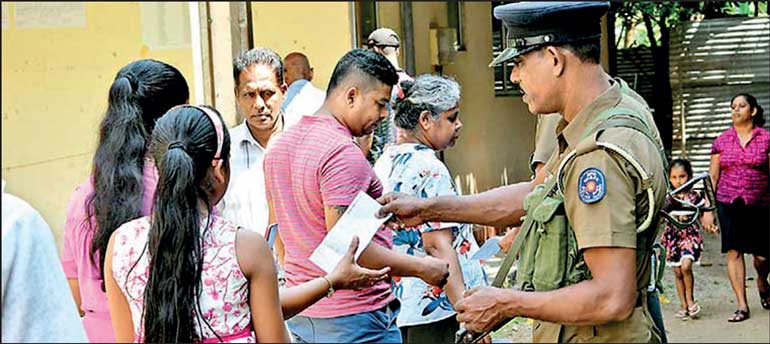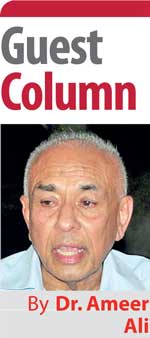Tuesday Feb 17, 2026
Tuesday Feb 17, 2026
Friday, 22 March 2024 00:20 - - {{hitsCtrl.values.hits}}

The next election if it were to be dominated by economic issues would be a contest between NPP’s system change with a market model cleansed of its rigidities and the IMF path embraced by its opponents – Pic by Shehan Gunasekara
 Election fever is gripping Sri Lanka. It appears that a General Election could precede the Presidential Election mainly because of Ranil Wickremesinghe’s (RW) rising unpopularity largely due to his IMF led economic recovery path.
Election fever is gripping Sri Lanka. It appears that a General Election could precede the Presidential Election mainly because of Ranil Wickremesinghe’s (RW) rising unpopularity largely due to his IMF led economic recovery path.
IMF for its part has no choice but to slow down its program after completing its second review, because election fever demands more time and energy from parliamentarians outside the legislature than inside, and consequently it would not be possible for the Parliament to pass the necessary reforms required for the recovery. Economy therefore is destined to take the back seat and allow politics to dominate national attention for the rest of the year.
However, a few developments on the economic front deserves a close look. The first is the appreciation of the rupee against the dollar and more importantly against the currencies of Sri Lanka’s trading partners such as India, Indonesia, Malaysia, Pakistan and a few others. It seems that RW and his cabinet ministers are overjoyed by this appreciation and claims credit for their economic policies. Nothing could be further from the truth.
Two economists, Bram and Howard Nicholas, in a critical analysis of the situation (see Daily Financial Times, 12 Feb. and 14 March 2024) and applying the Economist Big Mac composite index for their calculation had found that the rupee had appreciated by 46% in January 2024 to 52% in February and is expected to appreciate even further to 63%. Normally, appreciation of a currency in the long run reflects the relative productive efficiency of an economy and signals robust economic growth. But in the short term it could happen artificially due to import controls, capital controls, inflow of funds from repatriates, foreign investors and aid agencies, and even from an unexpected influx of foreign tourists. All this account for the current overvaluation of the rupee.
But the hidden danger in this hike is that it kills not only the export competitiveness of export industries but also hits the pay packets of workers employed in those industries. Overvaluation discourages the trading partners demand for our exports, which would hit the profit levels of exporters and would encourage them to maintain their profit margin by reducing the cost and especially wages of workers. Amidst the rising cost of living due to Government’s tight fiscal policy this wage reduction is bound to lead to unrest.
At the same time overvaluation would make foreign goods cheaper at home provided sellers allow the benefit to reflect through lower prices. That does not seem to be happening at the moment. Neither the CBSL chief’s boast over falling rate of inflation nor the appreciating rupee had benefited ordinary householders. However, to those who have the money to spare foreign travel becomes cheaper and given the parlous state of the economy that would encourage even more brain drain. On the whole, rupee overvaluation has become a “silent killer”, as the economists point out. Finally, when the existing controls are relaxed and when talks over foreign debt restructuring completed there will be an avalanche of depreciation which would spell disaster. This is why the IMF recovery agenda needs to be accommodated within a home-grown solution under a bird cage economy model as discussed previously (see CT Mar. 2 2024).
That means the economy at present is not a strong wicket to bat on for either RW and his UNP, or to their coalition partner LPP. Opposition parties are certain to bowl them out on that wicket. But do the opposition parties except NPP have any alternative route other than surrendering to IMF? So far there is no evidence to show they have one. This is why the next election if it were to be dominated by economic issues would be a contest between NPP’s system change with a market model cleansed of its rigidities and the IMF path embraced by its opponents. However, certain recent developments indicate that the campaign would shift more towards the usual emotive issues like Sinhala nationalism and Buddhism than economic alternatives. Except for NPP there is a bankruptcy of economic policies among all opposition parties. Gotabaya Rajapaksa’s book “The Conspiracy to Oust Me from the Presidency” sets the tone for what to expect in this campaign. It was GR’s and LPP’s campaigners who went door to door to canvass Sinhala votes by convincing the voters of a lurking threat to Buddhism and the Sasana in the wake of the 2019 Easter bombing, which strangely killed Christians and not Buddhists, that made 69 lakhs of voters to choose GR as President and LPP as the ruling party. The same Rajapaksas are confident that a repeated performance on the same theme would return them to power again. There are the usual suspects from the Sangha to perform their allotted role in this regard. There are also other groups which are prepared to adopt the same line of campaigning in addition to their specialty in whipping up anti-Indianism and anti-Tamil separatism.
Given these circumstances, RW would prefer the existing coalition strengthened by recruits from Sajith Premadasa’s SJB dissidents to capture Government so that he would be in a better position to contest for the presidency. Secret meetings and lucrative offers are reported to have been made to induce disgruntled elements from SJB to jump fence. There are also the two Muslim parties who are currently with SJB, but history shows that they are an easy prey for money and cabinet positions. This is why even with a promising economic alternative NPP’s chances of winning the race are promising but not guaranteed.
There is a substantial percentage of swinging voters who are not committed to any parties but mature enough to discern which party or leaders has the agenda to bring about meaningful economic changes without mortgaging the country to any foreign power. NPP has to win over this percentage. It is a tough ask but if achieved would be a historic landmark in the history of democracy in this country.
(The writer is attached to Business School, Murdoch University, W. Australia.)